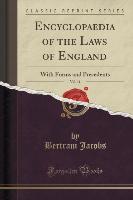Encyclopaedia of the Laws of England, Vol. 11
BücherAngebote / Angebote:
Excerpt from Encyclopaedia of the Laws of England, Vol. 11: With Forms and Precedents
Peace, Bill Of. - The bill of peace was the mode of seeking equitable relief when it was desired to definitely establish rights against numerous persons and avoid future controversy. It was similar to but not identical with a bill quia timet. "By a bill of peace we are to understand a bill brought by a person to establish and perpetuate a right which he claims, and which from its nature may be controverted by different persons at different times and by different actions, or where several attempts have already been unsuccessfully made to overthrow the same right, and justice requires that the party should be quieted in the right if it is already sufficiently established" (Story, Eq. Jurisprudence, 11th ed., s. 853). Its name, "bill of peace, " sufficiently indicates its obvious purpose-the securing for the person who brings the bill repose from continual litigation, and relief was granted on the well-settled principle of the Courts that multiplicity of suits was against public interest, and must be checked.
Accordingly, where a man set up a general exclusive right, and the persons who controverted it were very numerous, and he could not by one or two actions at law "quiet" that right, if he went to a Court of Equity the Court would direct an issue to determine the right, as in disputes between lords of manors and their tenants, or tenants of one manor and another, for in all these cases there would be no end of bringing actions for trespass, each action determining only the particular right in question between the plaintiff and defendant {Lord Tenham v. Herbert, 1742, 2 Atk. 483, 26 E. R. 692). The Court would in such cases grant a perpetual injunction.
Instances of cases, besides those above noticed, to which a bill of peace was held applicable, are rights of common, rights of fishery, and claims for tolls or profits of a fair. See, for illustrative cases, Mayor of York v. Polldngton, 1 Atk. (where rights of fishery enjoyed by Corporation of York and constantly exercised by them had been from time to time opposed by different lords of manors), Merritt v. Eastwicke, 1684, 1 Yern. 264, 23 E. R 459, 1 Abr. Ca. Eq. 79 (claim by several tenants to profits of a fair), Hew River Co. v. Graves, 1701, 2 Yern. 431, 23 E. R. 877 (bill to quiet the company in possession of pipes laid through the defendant's grounds).
About the Publisher
Forgotten Books publishes hundreds of thousands of rare and classic books. Find more at www.forgottenbooks.com
This book is a reproduction of an important historical work. Forgotten Books uses state-of-the-art technology to digitally reconstruct the work, preserving the original format whilst repairing imperfections present in the aged copy. In rare cases, an imperfection in the original, such as a blemish or missing page, may be replicated in our edition. We do, however, repair the vast majority of imperfections successfully, any imperfections that remain are intentionally left to preserve the state of such historical works.
Folgt in ca. 5 Arbeitstagen
